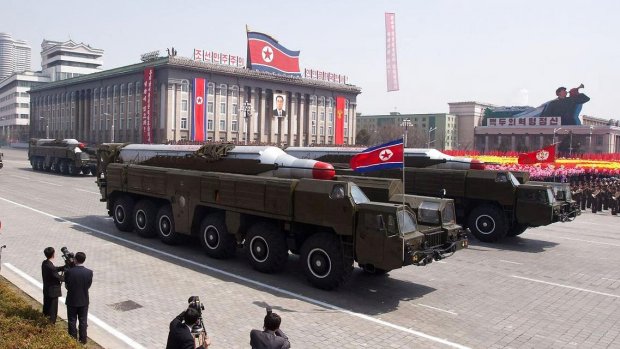The Obama administration, Congress and the media are finally showing some concern about the threats that have been emanating from North Korea since the beginning of the year. The Pentagon is moving an advanced anti-missile system to Guam just in case North Korea’s threats turn out to be more substantial than the administration clearly thinks they are.
That follows the announcement that the North Korean military has been cleared to wage an attack on the U.S. using ‘‘smaller, lighter and diversified nuclear ’’ weapons. On Tuesday, Pyongyang said that it is restarting operation of its uranium-enrichment program at Yongbyon for use in expanding its nuclear weapons arsenal. In March, it declared that it will no longer abide by the 1953 armistice that halted the Korean War. And in February, it conducted its third nuclear weapons test.
All this is very worrisome given that North Korea has as many as 10 nuclear warheads.
But the Obama administration’s response is cool, calm and collected. Such calm may be commendable but it is also curious when compared to its strident reaction to the possibility that Iran, which does not have nuclear weapons, might be approaching the point where it could start developing them. That is if it chooses to which, even Israel concedes, it hasn’t.
| “Because there is no lobby dedicated to fear-mongering about North Korea, our policy makers are able to approach the problems that country poses rationally, without considering the impact on campaign donors.” |
Nonetheless, the president has made clear that if Iran gets too close to developing a bomb, we may have no choice but to go to war. In fact, he has said that over and over again. The infinitely more real North Korean threat doesn’t rattle official Washington nearly as much, even though the United States has nearly 30,000 men and women in uniform still stationed in South Korea.
On Tuesday, White House spokesperson, Jay Carney, gave Obama’s response to the developments in North Korea. After saying that the U.S. prefers “denuclearization” of the Korea peninsula, Carney said:
We are taking appropriate measures in response to the bellicose rhetoric and provocative actions out of North Korea. But it is — these actions and this rhetoric is in keeping with a pattern of behavior by the regime in Pyongyang.
In other words, this is just North Korea’s “pattern of behavior” and there is nothing to worry about. Or, as an unnamed White House official told the New York Times, North Korea will back down because, to put it bluntly, they aren’t crazy:
…the senior official predicted that North Korea would eventually back down, as Mr. Kim’s need for food aid and hard currency outweighed the domestic political gains from his threats to shoot missiles at American cities.
“The North Koreans want the international community to feed their people, fuel their factories and fill their bank accounts,” the official said. “If North Korea were a self-sufficient enterprise, we would have a much bigger problem on our hands.”
But why exactly do we believe consider North Korea is deterred by the rational need to “feed their people, fuel their factories and fill their bank accounts” while a nuclear Iran could only be deterred militarily.
Prime Minister Binyamin Netanyahu explained the difference in his September 2012 speech at the United Nations. He quoted a neoconservative scholar, Bernard Lewis, who Netanyhu said, “put it best.”
He said that for the ayatollahs of Iran, mutually assured destruction is not a deterrent, it’s an inducement.
Iran’s apocalyptic leaders believe that a medieval holy man will reappear in the wake of a devastating Holy War, thereby ensuring that their brand of radical Islam will rule the earth.
That’s not just what they believe. That’s what is actually guiding their policies and their actions.
Then there is the ex-Mossad chief, Shabtai Shavit, who developed Israel’s Iran policy. He told Patrick Tyler, author of the magisterial Fortress Israel:The Inside Story Of The People Who Run The Country, that deterrence will not work with Iranians. He said that dealing with Stalinists is one thing but dealing with people willing to die following the return of Netanyahu’s “medieval holy man” is something else.
Muslims need to do what is needed to make him reappear , Shavit said, and only after a global [war] on the scale of Armageddon can this happen.
Tyler, now a historian but previously a long time New York Times correspondent, tried to argue with Shavit, offering evidence that in the 30 years since the Iranian revolution the government has not behaved apocalyptically but pragmatically. [Especially, I might add, when compared to North Korea.]
Shavit wasn’t buying it.
He had convinced himself that deterrence would not work; diplomacy would not work. The only thing that mattered was the worst-case view that Iran’s ayatollahs were in the grip of a messianic apocalyptic vision and if they managed to fabricate an atomic bomb, they would launch it against Israel, knowing that a retaliatory strike from Israel would annihilate millions of Iranians.
Why does any of this matter? It matters because it is the Israeli government and its lobby that has generated the hysteria in this country about Iran. Simply put, if it wasn’t for Israel and its lobby, the United States would no more consider bombing Iran’s reactors than North Korea’s. Nor would President Obama be ruling out containment, a policy that we utilized with the Soviet Union and which prevented war for 40 years. Because there is no lobby dedicated to fear-mongering about North Korea, our policy makers are able to approach the problems it poses rationally, without considering the impact on campaign donors. Instead, our Iran policy is primarily about domestic politics, domestic but driven by Netanyahu’s worldview, most notably his belief that you can’t negotiate with the likes of Shiite Iran.
Our Iran policy is nothing but an extreme case of Islamophobia. It’s time to get over it.
M.J. Rosenberg is The Washington Spectator‘s Special Correspondent for Middle East Affairs. He was most recently a Foreign Policy fellow at Media Matters For America. Previously, he spent 15 years as a Senate and House aide. Early in his career he was editor of AIPAC’s newsletter Near East Report. From 1998-2009, he was director of policy at Israel Policy Forum. Follow him @MJayRosenberg and @WashSpec.
Image courtesy of AFP via Globalist; video courtesy of Al Jazeera English.





0 Comments